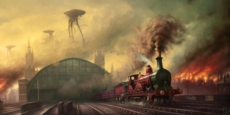
‘The end! The great and terrible day of the Lord!’ is demonstrating how religion is crumbling under the pressure, which is probably a direct attack from Wells; he despised religion, as he believed there was no equality in it; in fact it was a long-term opposition to socialism as such. The narrator goes on to say, ‘What good is religion if it collapses under calamity,’ which has been included as a subtle, but nonetheless direct question, aimed at the reader, intended to really make them doubt their imbedded beliefs, upon seeing its actual fragility in situations it is most needed in.
We begin to see the middle class of society falling from chapter sixteen; ‘By ten o’clock the police organisation, and by midday even the railway organisations, were losing coherency, losing shape and efficiency, guttering, softening, running at last in that swift liquefaction of the social body,’ which is a metaphorical death of society, which also serves to establish the continuing water imagery. ‘People were fighting savagely,’ sounds as though we were animals, as the adjective ‘savagely’ infers primitive and uneducated creatures, which is of course what the Martians had reduced the human race to. ‘By three, people were being trampled and crushed,’ reminds the reader of a chapter near the beginning of the book in which two women and a child were killed in the same circumstances, except, it will make the audience realise how little of society is upstanding, if people are now trampling each other when there isn’t even any immediate peril, as they have let fear consume them, which is something the middle class would not be expected to do, the situation irrelevant. The largest portrayal of broken society is; ‘the engines of trains that had loaded in the goods yard there ploughed through shrieking people,’ as there was no reason for murdering defenceless people; the verb ‘ploughed’ also suggests that it was a particularly violent act, and makes the people sound as if they were inanimate and worthless, as we plough over fields to prepare them for crops. Wells includes this to shock the audience as much as possible, as it would have been utterly unheard of, especially with the belief that the middle class would never act in such thoughtless terror. It is also quite ironic, as essentially, it is man’s own technology that has killed man; has the human race advanced too far? Would the Martians’ excessive advancement lead to their downfall too?
Further on in the chapter, we see yet more proof of the demise of society and the middle class itself; ‘It seems she had had a revolver all this time,’ is telling us that a woman had a weapon; women were expected to be delicate and defenceless. As such, this would be very thought provoking for the reader, as it would be rare to see anyone with a weapon, let alone a woman. This could be Wells’ challenging stereotypes again, as we see a different harsher, stronger side to women, much as he shows the working class as being intelligent despite prior belief.
Image: http://tomdenhamwritesstuff.blogspot.co.uk/2013/06/a-million-to-one-he-said-war-of-worlds.html

0 Comment:
Be the first one to comment on this article.